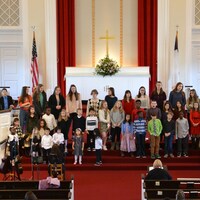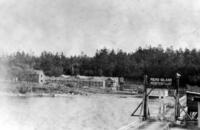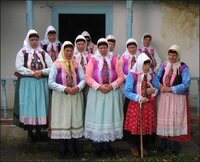-
Caspar Schwenckfeld’s Commentary on the Augsburg
Confession: A Translation and Critical Introduction
The purpose of this thesis is to present a
scholarly English translation, with appropriate background
matter and historlco-theological material, of Caspar von
Schwenckfeld's Commentary on the Augsburg Confession,
written sometime during or after Autumn, 1531. There is a brief biographical chapter, as well as short chapters on
Schwenckfeld's relationship with Luther and Melanchthon,
and a synopsis of Schwenckfeld's theology, with special
emphasis on themes presented in this Commentary (religious
liberty, concept of the Church).
-
 Schwenckfelder Church
Schwenckfelder Church
-
The Doukhobors in Canada
Academic article describing Doukhobor theology, history, and customs from Russia to Canada.
-
 Doukhobor penitentiary at Piers Island
Doukhobor penitentiary at Piers Island Archived photograph of Piers Island Penitentiary in British Columbia, CA. Dozens of Freedom Fighters (a sect of Doukhobors) were imprisoned there.
-
Sons of Freedom Doukhobors of Saskatchewan win communal land-holding, Canada, 1900-1907
Database description of the Doukhobors' petition and protest against signing the oath of allegiance to the Crown of the British Empire. The denial of their petition lead to nude marches which were prosecuted by the government. The marchers, Sons of Freedom (Freedomites), would employ this tactic in the following decades.
-
The Russian Doukhobors and Their Religious Teachings.
-
History of the Doukhobor Religious Sect and Its Transformation in Transcaucasia in the Late 19th Century
The main purpose of this article is to analyze how the Doukhobor community resettled and transformed in Transcaucasia, as well as how they emigrated to Canada. We often find in the sources that Dukhobors were pacifists. In 1895, they supposedly publicly burned their weapons in protest. Is that true? The article will also try to answer this question.
-
Doukhobors
Encyclopedia-style article detailing the history, culture, and religious beliefs of Doukhobors.
-
Doukhobor ‘freedom seeker’ nudism: Exploring the sociocultural roots
This article explores the reasons behind nude protests among some groups of Canadian Doukhobors in the early twentieth century...The author suggests that the choice of nudism as a form of protest by some Canadian Doukhobors (‘freedom seekers’) could be triggered by a combination of cultural clashes in the first years of the Doukhobor settlement in Canada, the Orthodox tradition of Holy Fools and Quaker influences. The article provides an overview of the consequences of the nude protest for the community and reports some contemporary attitudes of some Saskatchewan Doukhobors to these historical controversial protests.
-
Negotiated Memory: Doukhobor Autobiographical Discourse
The Doukhobors, Russian-speaking immigrants who arrived in Canada beginning in 1899, are known primarily to the Canadian public through the sensationalist images of them as nude protestors, anarchists, and religious fanatics – representations largely propagated by government commissions and the Canadian media. In Negotiating Memory, Julie Rak examines the ways in which autobiographical strategies have been employed by the Doukhobors themselves in order to retell and reclaim their own history.
-
A Great Host of Sympathisers»: The Doukhobor Emigration and its International Supporters, 1895–1905
Between September 1898 and July 1899, 7500 members of the non-resistant Doukhobor sect emigrated from Russia to Canada. This article investigates the networks of moral, logistical and financial support that made this emigration possible. Members of the Society of Friends in England and America, Tolstoyan Christian anarchists and opponents of the Tsarist regime worked, through their own networks and together, to raise funds and raise the Doukhobors’ profile. Their relationships with each other, with the Doukhobors and with external audiences were complicated by their own very different investments in the cause. This article explores the aims, activities and impact of this campaign, along with its value for the campaigners. It offers a case study of the complex relationships in such a campaign between humanitarianism, solidarity and self-interest.
-
Doukhobor Identity and Communalism at Kirilovka Village Site
Previous historical characterizations of the Doukhobors in Saskatchewan are inconsistent in their portrayal of the Doukhobors as an ethnic group and/or religious sect, and of the degree of internal cohesion and homogeneity at the community level. Combined archaeological and historical investigations suggest that the Doukhobor identity in Saskatchewan involves multiple levels of practice and belief. Further, Doukhobor identity is characterized by constant change brought about by repeated migrations through two centuries.
-
Ulichnye Familii Among the Doukhobors of the Caucasus and Canada
This article offers an analysis of the Doukhobor anthroponymic custom of ulichnye familii: the social factors leading to their adoption; the etymological
processes through which these names were formed; the manner in which they
were used and transmitted; and the elements contributing to their eventual decline and disuse. It also includes an inventory of extant ulichnye familii among the Doukhobors of the Caucasus and Canada, obtained through extensive field interviews and archival research.
-
 Doukhobors
Doukhobors
-
Message on Homosexuality
Message of the WBC regarding biblical teachings on homosexuality and how it relates to present-day society. Focus on America.
-
WBC Downloads: Other Documents, Old Fliers, Papers
Online collection of old WBC materials
-
COVID-19 is the wrath of God on the children of disobedience - Eph. 5:3
News release on the COVID-19 pandemic.
-
Divorce + Remarriage = Adultery
-
Westboro Baptist Church Website
Official website of the Westboro Baptist Church
-
Social control and the Westboro Baptist Church: Fuel to the fire?
The social control of protest can be carried out by a number of agents; among them are the police, legislators, organized countermovements, and the news media. This research examines how the tactics and strategies of the anti-gay Westboro Baptist Church (WBC) have been shaped and maintained through both internal and external elements of social control.
-
God hates: Westboro Baptist Church, American nationalism, and the religious right
Ethnographic book on the Westboro Baptist Church, analyzing history and religious practices in present-day context.
-
"Pray Not for this People for Their Good": Westboro Baptist Church, the Religious Right, and American Nationalism
The dissertation places the theology and activism of Westboro Baptist Church in the context of American religious history and suggests that Westboro Baptist Church's message of national doom that reflects a strand of thought that has always been present in American religion. Using radical flank theory, the dissertation examines Westboro Baptist Church in the context of the contemporary Religious Right, noting how the offensive message and in-your-face tactics of Westboro Baptist Church serve as a foil to the "compassion" of the Religious Right, centering and softening the Religious Right's anti-gay theology, which similarly argues that sexual sins damn a nation, and its anti-gay political activism.
-
Westboro Baptist Church
ADL profile of the church, including background, beliefs, legal cases, and direct quotes from the group.
-
Anger and Compassion on the Picket Line: Ethnography and Emotion in the Study of Westboro Baptist Church
In this reflection on the author's ethnographic study of Westboro Baptist Church, a small Kansas-based congregation infamous for preaching its anti-gay theology at funerals, including the funerals of fallen servicemen and -women, she questions the usefulness of denying an emotional connection with hatemongers. Instead, she argues for compassion for both the victims and, more challengingly, the perpetrators of hate in order to protect researchers from the threat of desensitization.
-
Desecration, Moral Boundaries, and the Movement of Law: The Case of Westboro Baptist Church
Using participant observation, in-depth interviews, and legislative histories, we examine Westboro Baptist Church, a religious group infamous for homophobic rhetoric and funeral protests. Employing cultural and interactionist perspectives that focus on the semiotics of death, the sacred, and desecration, we outline how Westboro’s activities purposively violate deeply held signifiers of moral order through language, while simultaneously respecting extant laws of behavior.
 Schwenckfelder Church
Schwenckfelder Church  Doukhobor penitentiary at Piers Island Archived photograph of Piers Island Penitentiary in British Columbia, CA. Dozens of Freedom Fighters (a sect of Doukhobors) were imprisoned there.
Doukhobor penitentiary at Piers Island Archived photograph of Piers Island Penitentiary in British Columbia, CA. Dozens of Freedom Fighters (a sect of Doukhobors) were imprisoned there. Doukhobors
Doukhobors